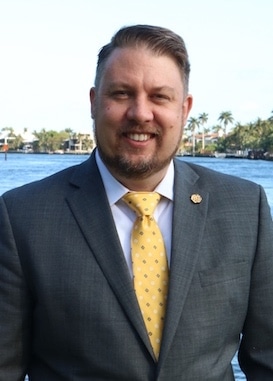When I hear pastors talk about what they wish they had learned in seminary before being in full time ministry I often hear comments like: liturgics, how to pray, conflict resolution skills, leadership development, how to read music and so on… I think that where a person goes to school, what their personal context is and what ministry track they are on often times determines these responses. For me though, there is something that I never thought of when God called me to be a pastor. I never thought about the fact that, as soon as I entered into this vocation, I would end up officiating the funerals for all of my family members who died before me.
I have had numerous people over the years say to me when talking about the difficulties of my vocation “Well, you knew what you were getting into”. Aside from being completely unsympathetic to the work of the pastorate that statement is simply untrue. Personally, I went to seminary not because I knew what I was getting into but because I believed that I was called and that call was affirmed. That was enough for me then and it still is today. That being said, it doesn’t mean that it isn’t a tough road sometimes. To date, in my nine years of ministry, post seminary, I have buried five of my relatives: two grandmothers, two great grandparents and an uncle.
 Just last week I officiated the funeral of one of my grandmothers, a wonderful woman, whom I loved. It was hard to say the least. But I can say without hesitation that having the honor of being the person who leads a celebration of someone’s life is humbling beyond words. Of course, nothing that one can say can equate to the totality of the impact that a person’s life had on the lives around them. But, even if for a moment, one can capture a glistening of the spark that embodied that person – and wrap that glistening in the Light that is Christ – then I believe that something momentously important transpires: The people who are mourning are comforted and given Hope. Below are some of the things that I have learned over the years that have been helpful to me both personally and as a pastor.
Just last week I officiated the funeral of one of my grandmothers, a wonderful woman, whom I loved. It was hard to say the least. But I can say without hesitation that having the honor of being the person who leads a celebration of someone’s life is humbling beyond words. Of course, nothing that one can say can equate to the totality of the impact that a person’s life had on the lives around them. But, even if for a moment, one can capture a glistening of the spark that embodied that person – and wrap that glistening in the Light that is Christ – then I believe that something momentously important transpires: The people who are mourning are comforted and given Hope. Below are some of the things that I have learned over the years that have been helpful to me both personally and as a pastor.
Writing It Out…
I have learned through my personal experiences that there is something very healing, vivifying even, about writing out what one thinks and feels about a person after they die. Personally, I have yet to cry while officiating a family funeral. It’s not because I haven’t mourned over the ones that I love – it’s because I weep through the construction of the sentences of remembrance that I write. By the time I am speaking about the person at hand, I have taken the time to mourn, cry, reflect, pray, honor, and restore dignity (if necessary) to the person whom I love. Somehow the difficulty of writing the garbled mess of emotions that flood us in times of grief creates a sacred space whereby our lives can be sorted with poetic license. I find in writing about the people I love that I must face the pain that I would otherwise unknowingly suppress. Such release is freeing and transformative because death fails to maintain its fearful grasp on the psyche of those who are still living.
Honor the Person in Question…
 I find that ultimately, when we love someone, we want to honor him or her. Life is complicated and not always flattering to the one who lived it yet, it is in the moments of celebrating one’s life that we have the opportunity to bring forth all that God made good about a person. Truth be told, we probably should be doing this everyday with one another – but in death – it seems particularly important to honor the person in question – to share how they contributed to whatever community they belonged to, to express how their life mattered to us and to say how and why we loved them.
I find that ultimately, when we love someone, we want to honor him or her. Life is complicated and not always flattering to the one who lived it yet, it is in the moments of celebrating one’s life that we have the opportunity to bring forth all that God made good about a person. Truth be told, we probably should be doing this everyday with one another – but in death – it seems particularly important to honor the person in question – to share how they contributed to whatever community they belonged to, to express how their life mattered to us and to say how and why we loved them.
Articulate the Words…
Writing the words out helps me to organize my thoughts but saying them out loud to someone gives them life. Great authors can stir our imaginations but orators (great or not) make the words their own. There is something to be said about claiming the words with one’s own inflection, the sound of one’s voice (even if it quivers at times), the way one looks as they speak, the motions of one’s body – the space that one creates in between words and sentences. Articulating written thoughts personalizes the intention and actualizes one’s thoughts. The words become living, certainly far more than stagnant.
The “G” Word.
 Many people despise religion, dislike pastors, and can’t stand churches. I get that. Churches are full of hypocrites, pastors are hypocrites (myself included) and religion typically embodies the concept of hypocrisy. I personally struggled with these issues myself for a very long time until I realized that churches are full of self-proclaimed sinners. Once a person comes to understand that fact, it becomes far easier to help try to find solutions to problems rather than continuing to complain about all of “those” people that are hypocrites. What is more hypocritical? Helping to solve problems or identifying the problem and then sitting on the sideline?
Many people despise religion, dislike pastors, and can’t stand churches. I get that. Churches are full of hypocrites, pastors are hypocrites (myself included) and religion typically embodies the concept of hypocrisy. I personally struggled with these issues myself for a very long time until I realized that churches are full of self-proclaimed sinners. Once a person comes to understand that fact, it becomes far easier to help try to find solutions to problems rather than continuing to complain about all of “those” people that are hypocrites. What is more hypocritical? Helping to solve problems or identifying the problem and then sitting on the sideline?
In spite of all of these issues though, in my experience, most people don’t really have a problem with God or the concept of God – they just wish that God would get better representation. Good News! God already did. His name is Jesus Christ.
I find that if presented lovingly, people who are mourning typically won’t pass up at least the consideration of a God who loves them. The alternatives when facing death seem pretty stark.
Being Pastoral… Being Present.
I have officiated funerals for people who have committed suicide. I have seen parents bury their children. I have many a time seen a spouse lose the love of their life. Each of these losses are tragic and heartbreaking.
It’s not our role as humans to judge a person’s eternal state and we very much need to remember that fact. Christians are called to love one another in life and in death. You would think that this would go without saying… but you also might be surprised at what is said at times.
What, I think we need to remember is that God Loves us. And if all the hype is true – well then what is impossible for man is possible for God – no matter the issue. Some of the most precious and simultaneously heartbreaking moments of my life have been watching the living hold and caress one they loved who had died. In those moments sometimes the best thing that we can do is simply to be present. We don’t always need to be waxing philosophical, sometimes we just need to be – and in being we show that we care. Additionally, there is something to be said for the careful preparation of and attention to both the deceased and the living. People want to know that their loved one will be treated with dignity. As human beings we at least own that courtesy to one another.
For me there is hope in the resurrection and I try to share that encouragement with all who willingly receive the words. For me such a state has implications of eternal restoration and renewal. If the departed was suffering, that suffering is no more. If the deceased was lame or debilitated in some way they are restored. If the departed’s life was cut short they need not wait for such renewal. Peace can be had knowing that the person we love has gone before us and that they are being cared for. Henry Van Dyke, a 19th Century clergyman articulated these words far better than I when he wrote A Parable of Immortality. I used these words recently in the message for my grandmother’s funeral.
The parable reads:
I am standing upon the seashore.
A ship at my side spreads her white sails to the morning breeze
and starts for the blue ocean.
She is an object of beauty and strength,
and I stand and watch until at last she hangs
like a speck of white cloud
just where the sea and sky come down to mingle with each other.
Then someone at my side says,
” There she goes! ”
Gone where?
Gone from my sight . . . that is all.
She is just as large in mast and hull and spar
as she was when she left my side
and just as able to bear her load of living freight
to the place of destination.
Her diminished size is in me, not in her.
And just at the moment
when someone at my side says,
” There she goes! ”
there are other eyes watching her coming . . .
and other voices ready to take up the glad shout . . .
” Here she comes! ”
In resurrection, we can have hope that when our time comes to a close on this Earth as well, we will hear the voices of the ones we love as they too shout acclamations of our coming arrival.
Happy Easter.






























